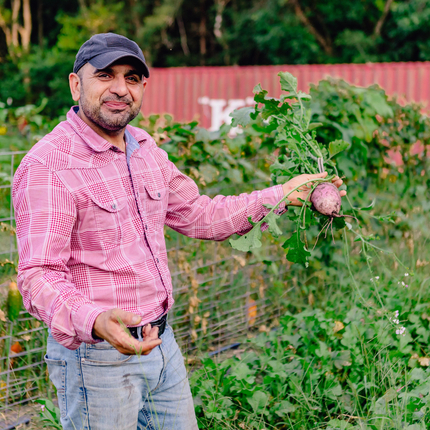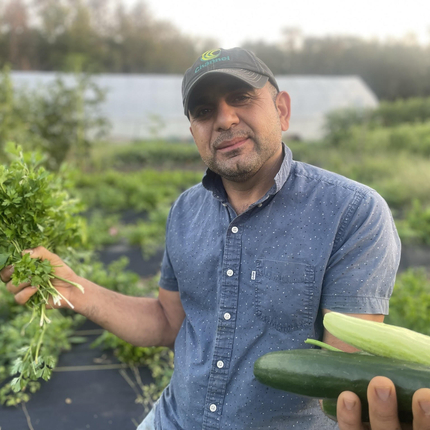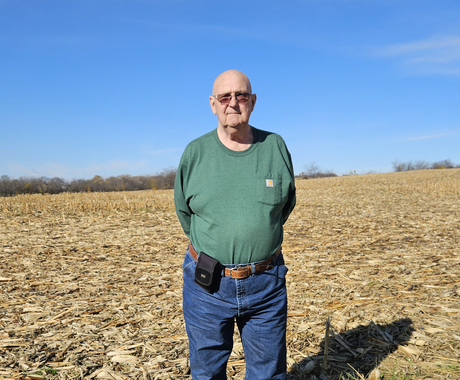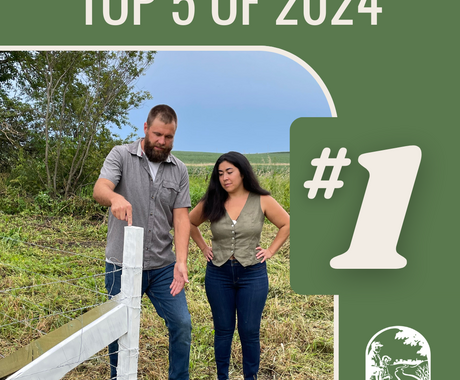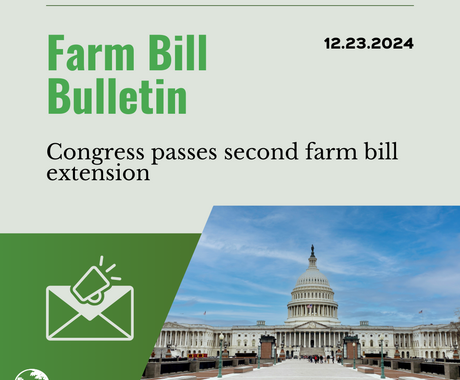Shahab Bashar leads a quiet life as a farmer in Lincoln, Nebraska, but the road getting there has been paved with challenges.
Born and raised in northern Iraq, Shahab had his first taste of agriculture as a child when his father farmed off and on between 1994 and 2000 when there were limited work opportunities due in large part to U.S. sanctions on Iraq.
In college, he studied biology, then worked as a lab technician and primary school teacher. In 2014, he survived the genocide of the Yazidis (a Kurdish religious minority) perpetrated by ISIS. In 2017, Shahab, his wife, Hanaa, and their oldest daughter were able to move to the U.S. through special visas obtained because Hanaa’s brothers were working with the U.S. Army in Iraq.
When he arrived, Shahab struggled to find a job or a place to live. Then he found Community Crops, a program of Family Service Lincoln that empowers people to grow food through education, experiences, and resources.
“I heard Community Crops was looking for someone from the Yazidi community to work as an interpreter and translator,” Shahab said. “It was only a few hours a week, but I took the job right away because I wanted to learn more English and become involved in the Lincoln community.”
That part-time job evolved into coordinating a group of four or five people from the Yazidi community to farm and start a series of classes. He and his wife became part of that group and started farming in 2019. Now, Shahab works as a farm program specialist with Community Crops.
Shahab is fluent in English, Arabic, and Kurdish, but he knows some of the biggest barriers for people new to the U.S. are language and access to resources. Through his work at Community Crops, Shahab strives to learn more about growing food in the U.S. so he can share that knowledge with everyone in his community, many of whom do not speak English.
Shahab’s co-worker, Amy Gerdes, told him about an opportunity to broaden his farming knowledge through the Center for Rural Affairs Beginning Farmer Conservation Fellowship. The program began in 2022 with eight individuals, plus mentors. The most recent cohort began in spring 2024 with eight beginning farmers, including Shahab and Amy.
Shahab and his wife farm at Prairie Pines, a location owned and managed by Community Crops. Much of Shahab’s focus is growing a diverse array of vegetables to help others like himself who have come to the U.S. and experienced some culture shock, exacerbated by not having access to traditional cultural foods.
Nebraska weather differs from that in Iraq. The climate is more dry in Iraq, summers are warmer, and the soil is more sandy. People in northern Iraq grow garden cress, daikon radishes, pickling peppers, sunchokes, green eggplant, cutting celery, Armenian cucumbers, dates, sesame, sunflowers, figs, and more from seeds that have adapted to limited rainfall and no extra watering. Shahab has been trying to grow crops from those seeds at Prairie Pines.
“We need to grow our own food to live healthy, to spend less money, and for the health of future generations,” Shahab said. “In the Lincoln Yazidi community, we cook at home most of the time, mostly vegetables. It’s important to save the seeds and continue to grow from them.”
Before he started farming in Lincoln, Shahab’s community had trouble finding some of the produce they were used to eating in Iraq.
“My farm is my paradise,” Shahab said. “I grow food to feed people healthy, cultural produce. Along with my colleagues, we help grow things so people from the Middle East can find and enjoy those foods in Lincoln.”
As part of the program, conservation fellows design and implement a project on their own farms or land they are farming. They present their findings at a farm tour to their mentors, project partners, and other beginning farmers.
With guidance from his mentor, Shahab decided to focus his project around growing grapes, apple trees, and white mulberry trees in raised beds. He named the project Residential Urban Agriculture, and so far he has figured out the cost and location. Shahab and his mentor are working to iron out the rest of the details and will put the plan into action within the next few months.
Through his time as a fellow, Shahab has found value in meeting new people and learning from other farmers.
“I’ve been gaining new skills and knowledge, as well as gathering resources about farming, soil, pollinators, and more from every class, event, and conference I’ve attended,” he said. “I’ve also found out how farmers run their farmland, as well as how to manage water and resources and how to access them. I hope this experience will help the people around me when I pass on what I have learned.”
Shahab’s goal is to grow more food to feed more people, and to see farming traditions carry on into the next generation, including with his daughters, Arjeen, Aveen, and Alina.
“Farming is life; soil, water, animals, plants, fungi, protozoa, and microorganisms are all part of our lives, and if we care about them, they will care about us,” he said. “Nowadays, we do not have many people growing food, especially young people. I know how many farmers I’ve helped join farm programs and how many gardeners in their backyard or at our gardening program. I also know how many people I helped order seed or save seed and find access to resources. Since I started farming, I’ve seen the results and am happy with the progress I’ve made.”
The Beginning Farmer Conservation Fellowship is a program of the USDA-NRCS under agreement number NR243A750003C010 Conservation Outreach: Equity Conservation Cooperative Agreements.

